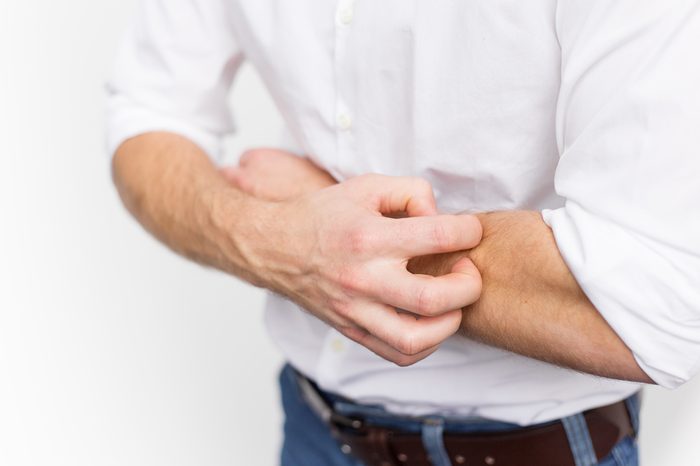
Kidney disease
Intense itchy skin all over the body often occurs in people with late-stage kidney disease or those who suffer from chronic renal failure. In fact, 42 percent of dialysis patients suffered from moderate to extreme itchiness, according to a study published in Renal Failure. “Some people describe it as a nuisance,” says Anthony M. Rossi, MD, dermatologist and Mohs surgeon at Memorial Sloan Kettering Cancer Center and New York-Presbyterian Hospital. “[The itch] is so intense that people wake up in the middle of the night scratching.” Science has yet to uncover why kidney disease causes itchiness, but doctors suspect it has to do with the build-up of toxins in your body when your kidneys are unable to remove the waste from your bloodstream. Aside from treating the disease, a doctor may prescribe medications like gabapentin, an anti-seizure medicine that’s been FDA-approved for off-label use to quell renal itch.
Get The Healthy @Reader’s Digest newsletter
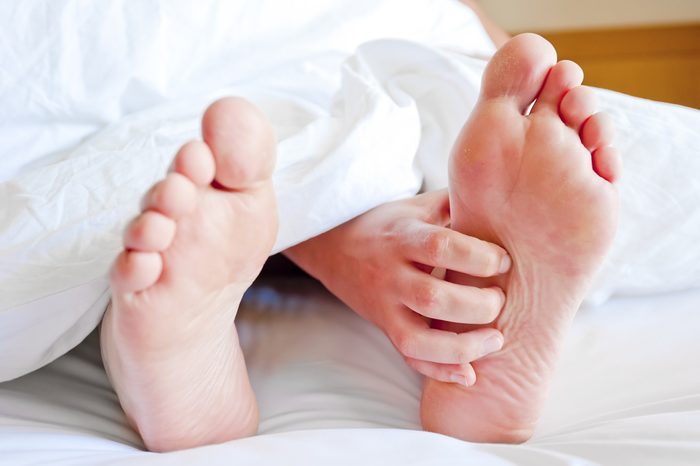
Liver disease
Itchy skin all over could also be a silent sign of liver disease. Where incessant itchiness shows up late-stage in kidney disease, it can be an early symptom of liver disease. “If your liver is not functioning properly to detoxify the body, byproducts like bile acids back up,” says Kathleen Cook Suozzi, MD, assistant professor in the department of dermatology at Yale School of Medicine. “The primary goal is to treat the underlying liver disease and prescribe medications that can eliminate bile acids.” Doctors will typically prescribe medications that can inhibit your body’s uptake of bile acids or help reduce the amount of bile acid returning to the liver.’
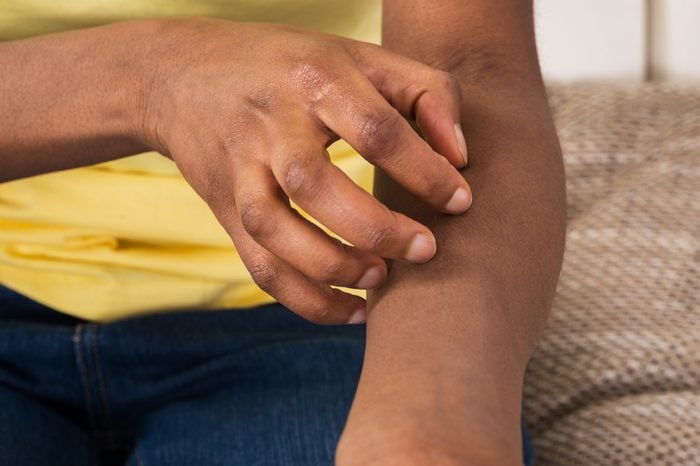
Dermatographia
If after lightly scratching your skin, your fingernails leave thin, raised red welts on your skin that take 15 to 30 minutes to disappear, you may suspect dermatographia or dermatographism, a form of chronic hives. “It’s an extreme skin condition, where your skin is sensitive to touch and releases too much histamine,” says Cameron Rokhsar, MD, associate clinical professor of dermatology at Mount Sinai Hospital and dermatologist and cosmetic surgeon at New York Cosmetic, Skin & Laser Surgery Center. Although the cause of this condition is unclear, it may be triggered by stress, infections, allergens, or medications, he says, adding that areas commonly touched by other skin or clothing are the most susceptible to dermatographic flare-ups. It’s easy to diagnose but often goes undiagnosed because it’s not severe or bothersome enough for people to make an appointment with their dermatologist. If the itch becomes severe, your doctor can prescribe an antihistamine to relieve the inflammation, he says. For patients with severe hives who don’t get better with antihistamines, omalizumab injections in a doctor’s office may provide relief. Here are 8 trusted home remedies for itchy skin.
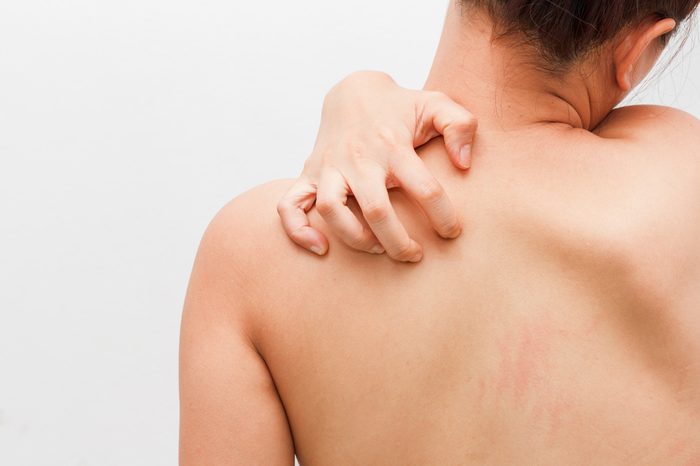
Spinal disease
Chronic itchy skin on the upper middle section of the back (without a rash) can be a hallmark of neuropathic itch, a symptom of nerve malfunction. Before providing treatment, doctors will first rule out spinal cord disease as a cause. Research has shown that spinal disease, whether due to age or injury, can apply pressure on the nerve and pinch it, which results in an itchy sensation on the skin. Neuropathic itches can occur on one side of the body or both, but it’s a big red flag if scratching brings no relief. “People with eczema get a good sensation from scratching,” says Dr. Rossi. “But [nerve itch] doesn’t improve with scratching. The itch intensifies most of the time.” Some people say it feels like insects are crawling on them. Once spinal cord disease or other health conditions have been ruled out, neuropathic itches can be treated with capsaicin cream, which is derived from hot peppers, to burn out the nerves that are firing irregularly on the skin.
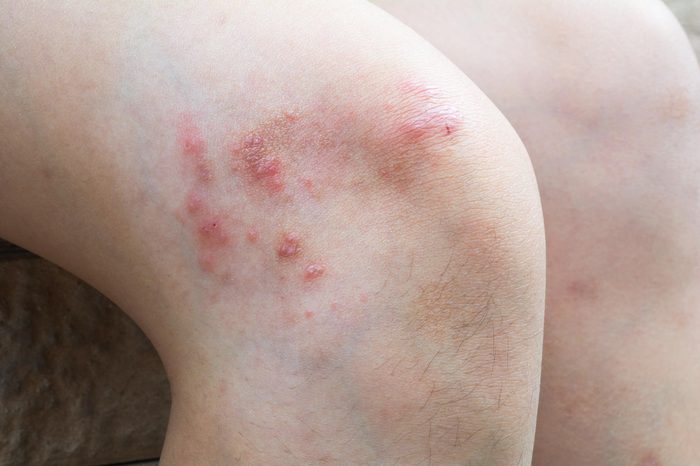
Celiac disease
Extremely itchy bumps or blisters on knees, elbows, buttocks, and/or hairline may be signs of dermatitis herpetiformis (DH), a skin manifestation of celiac disease, says John Zone, MD, chair of the Department of Dermatology at the University of Utah and Celiac Disease Foundation medical advisory board member. Basically, when a person with celiac disease eats food containing gluten, their immune system responds by producing antibodies called immunoglobulin A (IgA). These IgA antibodies travel to and bind with the skin cells to trigger an itchy response. The prescription Dapsone can provide short-term itch relief for the skin, but if the intestinal damage is serious patients have to adopt a strict gluten-free diet for life. If they continue to eat gluten, celiac patients can develop malnutrition, anemia, bone loss, ulcerative colitis, and even cancer.
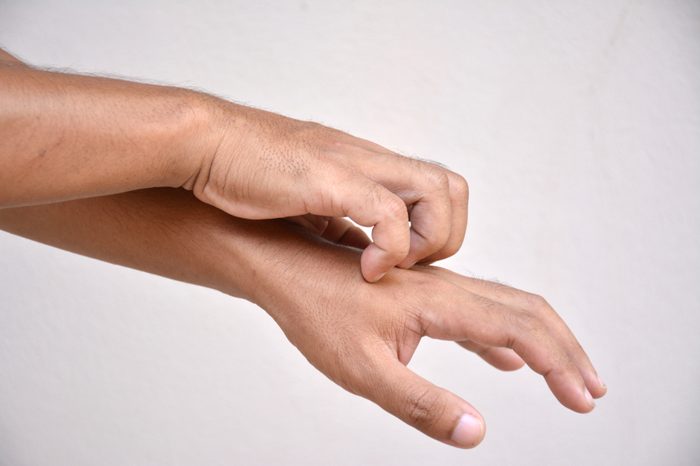
Lymphoma
“The other thing that you want to rule out are blood disorders,” says Dr. Suozzi. “Anywhere from five to 30 percent of lymphomas such as Hodgkin’s and non-Hodgkin’s can present with itch.” Itchiness with or without a rash can be the first symptom of Hodgkin’s disease—likely caused by cytokines, cell signal molecules that trigger inflammation in response to infection. If your doctor suspects lymphoma, she may order a chest X-ray. If you’re diagnosed with the disease, the itching will cease soon after starting chemotherapy or radiation therapy.
9 Little Body Changes That Could Signal a Bigger Health Problem
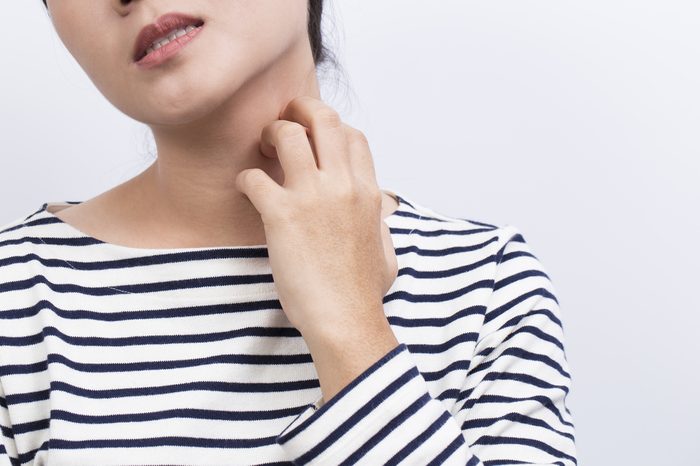
Thyroid disease
“Thyroid disease, whether it’s overactive or underactive, can cause weird sensations in the skin,” says Dr. Rohskar. “No one knows the association but it may be that the changes in the sweat glands can cause skin dryness.” Itchy, dry skin is more common in people who have hypothyroid because skin tissue contains thyroid hormone receptors that are seeing diminished cellular activity in the absence of thyroid hormone.
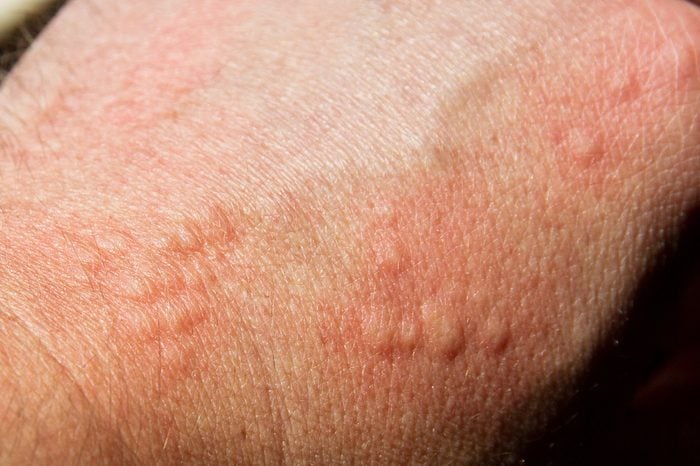
Allergies
Allergies are one of the most common chronic health conditions in the world. In fact, many skin allergies are classified under the umbrella term contact dermatitis, the itchy rash on your skin that you get when you come into contact with an allergen. Poison ivy, nickel, or compounds found in personal care items like baby wipes and makeup are just a few of the allergens that can cause contact dermatitis. If the itchiness is localized to your eyes, if could be a sign of eyelid dermatitis. Your dermatologist or allergist can use a patch test to figure out what your triggers are. “It’s like a treasure hunt when we’re trying to look into all the products that people use,” says Dr. Suozzi. A strong topical steroid is prescribed for relief.
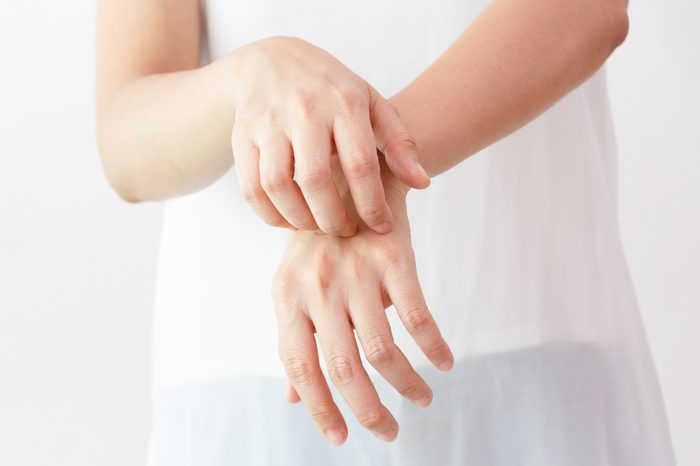
Menopause
If you’ve finally hit menopause, you may have noticed a sudden change in your appearance—including dry, itchy skin. The loss of estrogen, an essential building block for collagen production, leads to thinner, itchier skin due to a diminished supply of natural oils that keep your skin’s moisture intact, says Sherry Ross, MD, an OB/GYN and author of She-ology. Maintain your fountain of youth with aloe vera gel or calamine lotion, which help hold water in your skin’s outermost layer to alleviate drying and itching.

Breast cancer
Paget’s disease of the nipple is an incredibly rare form of breast cancer where cancer cells collect in or around the nipple. According to the National Cancer Institute, Paget’s disease of the nipple accounts for less than 5 percent of all breast cancer cases in the United States. The first sign is scaly, red, itchy patches around the nipple and areola. “Sometimes it’s misdiagnosed as eczema of the nipple,” says Dr. Suozzi. “But when it’s breast cancer-associated, it’s unilateral.”
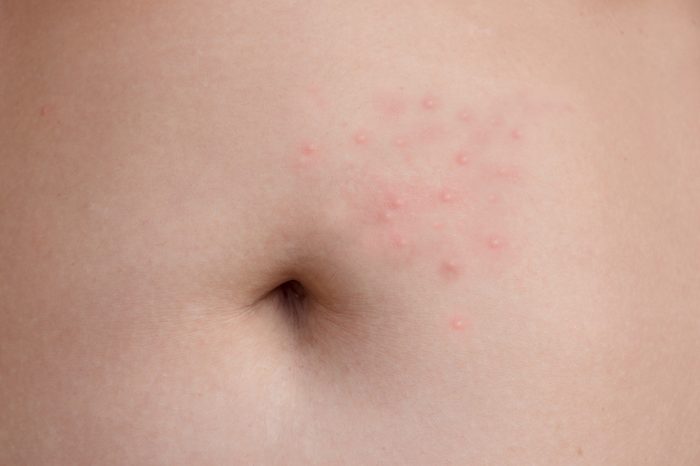
Pregnancy
The American Pregnancy Association states that 1 in 150 women will develop pruritic urticarial papules and plaques (PUPP), an outbreak of itchy red rashes commonly seen on the abdomen, though they can also appear on your legs and arms. Most women can’t do much about the itch because the rash typically doesn’t develop until late into the third trimester when most medications are off-limits. “It’s not proven but some people say [PUPP] can happen with multiple gestations like twins,” says Dr. Rossi. “And some people think it’s because the skin gets stretched out.” Fortunately, it’s harmless and goes away after pregnancy. Now that you know why you may have itchy skin, read about these strange symptoms that can signal a serious disease.
For more wellness updates, follow The Healthy on Facebook, Instagram, and Twitter. Keep reading:
- The 3-Step Skincare Process Derms Are Recommending This Summer—and 3 Products to Halt Until Fall
- 9 Ways ‘Trauma-Informed Exercise’ Is Different, Says an Abuse Survivor-Turned-Trainer
- The Most Breathable Women’s Underwear You Can Buy, According to Gynecologists
- 4 Surprising Areas You Should Be Slathering in Sunscreen, Says Research
